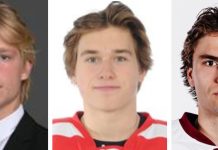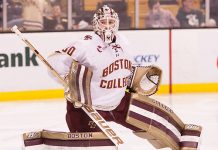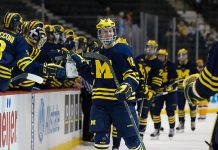So here we are.
It’s the week of the Frozen Four, and on Saturday night either Yale, Quinnipiac, St. Cloud State or Massachusetts-Lowell will be crowned the NCAA hockey champion for the 2012-13 season.
Suffice it to say, this isn’t your typical Frozen Four. So, it’s only fitting that when the 2013 Hobey Baker Award is presented on Friday night, its winner will also be atypical, to one degree or another.
While I did correctly predict last week that the Hobey Hat Trick would consist of Boston College forward Johnny Gaudreau, Quinnipiac goaltender Eric Hartzell and St. Cloud State forward Drew LeBlanc, what I didn’t comment on at the time is what this group means for the 2013 Hobey. Now that we know that one of these three players will win the most prestigious individual honor in college hockey, it’s worth commenting that each one comes from a group that typically doesn’t win the Hobey.
In Hartzell, of course, we have a goaltender. As we’ve been over time and again in the Hobey Watch, only two goaltenders have won the award: Robb Stauber in 1988 and Ryan Miller in 2001. And of course, Miller’s landmark numbers from that season — 1.32 goals against average, .950 save percentage — have become the de facto standard against which all other goalies have been judged when they’ve come up for the Hobey.
I’ve raised the argument in the past that Cornell’s David LeNeveu would have won in 2003 had the field not included Peter Sejna and his 82 points, and I think it’s fair to say that LeNeveu would run away with the award had he been part of this year’s field.
But he’s not, and instead we have Hartzell, the ECAC Hockey player of the year who has backstopped the Bobcats to the No. 1 ranking, an ECAC regular season championship and a Frozen Four berth, posting a 1.55 goals against average, a .933 save percentage and five shutouts along the way. An excellent year to be sure and well worthy of every laurel that Hartzell has received, but still, it’s fairly obvious that Hartzell doesn’t have those elusive “Ryan Miller numbers” that are presumed to be required for a goalie to win the Hobey. So, conventional wisdom would dictate that he doesn’t win.
In LeBlanc, meanwhile, we have a playmaking forward with 13 goals and 37 assists this season. I’ve made a regular point in the Hobey Watch about the idea that “Hobey loves goals,” and it is worth noting that if LeBlanc is indeed this season’s Hobey winner, he will most likely do so with the fewest goals of any Hobey-winning forward.
To date, the lowest goal total by a forward who won the Hobey belongs to the inaugural Hobey winner, Minnesota’s Neal Broten, who had 17 goals and 54 assists in the 1980-81 season. Folks who were around back then have spent some time wondering why it was Neal who won the award and not younger brother Aaron (47 goals, 59 assists), and if I had to guess, it probably had something to do with Neal’s participation in the “Miracle on Ice” the year before. If that’s the case, then it would make a LeBlanc win even more unprecedented.
Finally, there’s Gaudreau. While Gaudreau has been viewed as the front-runner for most of the year, the fact remains that he is “the little guy from BC.”
Earlier this year, I ran through the BC forwards who have been finalists for the Hobey during Jerry York’s tenure as head coach — Brian Gionta, Chris Collins, Nathan Gerbe, Cam Atkinson, etc. — and wondered aloud if the seeming ubiquity of this type of high-scoring forward at the Heights may contribute to a lack of respect from Hobey voters (since, after all, defenseman Mike Mottau is BC’s only Hobey winner under York).
After all, if they seem to be almost interchangeable, how special is the guy putting up those numbers this year? Still, by most conventional measures for the Hobey, Gaudreau seems to fit the profile best. Does that mean he’ll win? We’ll find out Friday.
Last week, I appeared on USCHO Live! with Jim Connelly and Ed Trefzger, and at the end of my interview, Jimmy put me on the spot and asked me whom I think will win. My answer at the time was LeBlanc, but before I finish off this blog entry, I want to conduct a little thought exercise to put a little more method into my prediction.
I’ve never been on the Hobey committee, but I’d like to think that if I was, I would judge Hobey candidates as if I were a judge on “Iron Chef America” (I’m sorry, even in a dream like this, I couldn’t see myself as worthy of sharing the stage with the likes of Asako Kishi and Shinichiro Kurimoto).
Just as Iron Chef judges can award up to 10 of the 20 total points for taste, five for plating/presentation and five for creativity in use of the theme ingredient, I would award Hobey candidates up to 10 points for their individual on-ice performances, five for team success and five for leadership, character and academics.
So before I sign off, I’m going to apply these criteria to the Hobey Hat Trick, and see who emerges as my winner.
Johnny Gaudreau
On-ice performance: 8.5 points. In this year’s field, Gaudreau is tops as the national points-per-game leader — and is unquestionably the most dynamic player in college hockey this season — but the 9-10 range is reserved for candidates who are superlative in a larger context (Paul Kariya and Ryan Miller would be 10s here, for example).
Team success: 3.5 points. No trophy more significant than the Beanpot makes this an off year for BC. I give Gaudreau a bit of a bump for his role in the Eagles’ NCAA title a year ago (think Matt Carle in 2006), but the Hobey should really be about this year.
Leadership/character/academics: 3.5 points. Gaudreau is a solid citizen by all accounts, but as an underclassman (and a sophomore, at that), he’s not at a point where he’s had an opportunity to build much of a record in terms of academics or leadership.
Total: 15.5 points
Eric Hartzell
On-ice performance: 7.5 points. Being recognized as player of the year in ECAC Hockey is a well-deserved honor, but the truth is there’s a better goalie in college hockey this year (Connor Hellebuyck of Massachusetts-Lowell), and Hartzell was not the national leader in any major goaltending category.
Team success: 4.5 points. Quinnipiac has two of the big three — winning the regular season conference title and getting to the Frozen Four but falling short for the conference tournament title — and Hartzell has been a key to those achievements, not to mention the top overall seed that the Bobcats earned.
Leadership/character/academics: 4 points. Hartzell is a senior, and seniors do seem to get a bit of a bump in the Hobey voting, and he’s never been in any trouble to speak of. However, there’s nothing that really stands out about him in this area. Solid but unspectacular rates a 4.
Total: 16 points
Drew LeBlanc
On-ice performance: 8 points. He’s the WCHA player of the year, but knowing how much the Hobey voting tends to favor goal-scorers where forwards are concerned, it’s hard to see LeBlanc getting more than eight points here.
Team success: 4.5 points. Like the Bobcats, the Huskies got two of the big three, winning the MacNaughton Cup and earning a trip to the Frozen Four. That doesn’t happen without LeBlanc.
Leadership/character/academics: 4.75 points. LeBlanc gets a lot of points here for being both player of the year and student-athlete of the year in the WCHA (I addressed POTY up top, but the player/student-athlete double is especially impressive), in addition to being a captain for this Huskies team that has gone where no other SCSU team ever has. I’m tempted to go full-marks here and give him a 5, but I kind of feel like I should leave some room for that rare candidate who manages to be a Hockey Humanitarian Award nominee or finalist as well.
Total: 17.25 points.
There you have it, folks. My first attempt to truly do the math with a Hobey ballot produces Drew LeBlanc of St. Cloud State as our predicted winner. Will he win on Friday night as well? Stay tuned.


